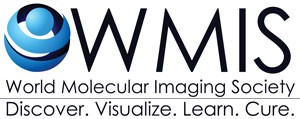The Gold Medal is the highest honor awarded by WMIS and highlights outstanding molecular research and new discoveries focused on the integration of molecular imaging into science and healthcare to develop innovative complementary approaches to understand biology and improve patient care.
2024 Gold Medal Award

Peter Caravan, PhD
Massachusetts General Hospital, Harvard Medical School
Dr. Caravan, Co-Director of the Institute for Innovation in Imaging at MGH and Harvard Professor of Radiology, is honored for his contributions to molecular imaging research, particularly in the development and clinical translation of MR imaging probes and radiopharmaceuticals. Dr. Caravan heads a multidisciplinary translational molecular imaging lab dedicated to developing novel molecular probes with diverse applications in cardiovascular, pulmonary, renal, hepatic diseases, and cancer.
2023 Gold Medal Award
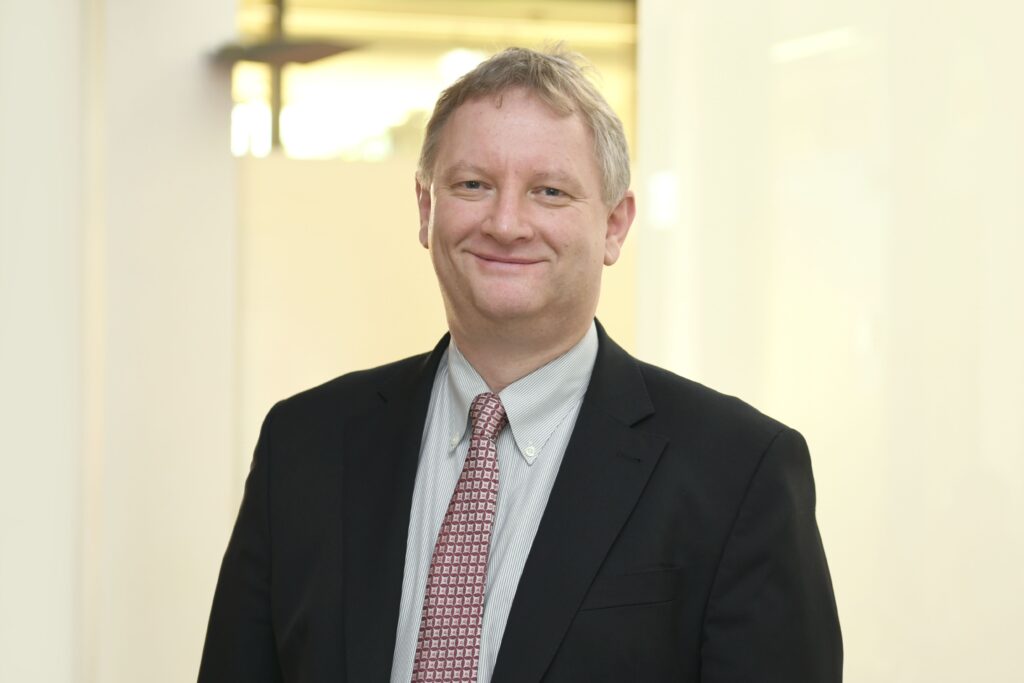
Bernd Pichler, PhD
University of Tübingen
Dr. Pichler was awarded in recognition of extraordinary achievements in molecular imaging research that have led to paradigm-shifting technological and methodological advances and creating key insights into human diseases. The Gold Medal Award lecture was held during the Closing Ceremonies on Saturday, September 9th 2023 and can be seen on demand.
2022 Gold Medal Award

Anna Wu, PhD
City of Hope
Anna Wu has received the Gold Medal for her science of applying protein engineering to optimize the properties of antibodies for the in vivo delivery of radionuclides in preclinical models and patients, which has led to widespread acceptance of immunoPET as a versatile molecular imaging strategy. The Gold Medal Award lecture was held during the Closing Ceremonies on Saturday, October 1 2022 and can be seen on demand.
2021 Gold Medal Award

Jason Lewis, PhD
Memorial Sloan Kettering Cancer Center
Lewis is the Emily Tow Jackson Chair in Oncology, the Vice Chair for Research, Department of Radiology and the Chief of Radiochemistry and Imaging Sciences Service at the Memorial Sloan Kettering Cancer Center. He has published more than 200 papers, books, book chapters, and reviews on cancer imaging. Lewis serves on grant review panels for the National Institutes of Health and National Cancer Institute and a number of editorial boards. His remarkable combination of scientific creativity, laboratory acumen, work ethic, enthusiasm and communication skills made him a singularly exceptional scientist and educator.

Martin Pomper, PhD
Johns Hopkins Medicine
Pomper contributed to the development of radiopharmaceuticals for PET and SPECT for a variety of indications, including cancers, inflammation, and central nervous system disorders. Pomper and his team also developed a general technique for molecular–genetic imaging and therapy of cancer. He co-founded several Johns Hopkins start-up companies, enabling the translation of several academic discoveries to commercial applications. He is the author of more than 300 peer-reviewed articles across a broad spectrum of preclinical and clinical molecular and functional imaging applications.
2020 Gold Medal Award

Thomas Meade, PhD
Northwestern University, USA
“Sustained research in the areas of magnetic resonance and optical molecular imaging, visionary breakthroughs for deep tissue imaging, and advances in quantitative and biologically specific interrogation of living systems.”
The 2020 Gold Medal Award winner was Thomas Meade, Ph.D., who currently serves as the Eileen M. Foell Professor of Cancer Research and Professor of Chemistry, Molecular Biosciences, Neurobiology, Biomedical Engineering and Radiology at Northwestern University. He is also a member of the Chemistry of Life Processes Institute (CLP). Meade is widely recognized as a pioneer in the field of conditionally activated magnetic resonance (MR) agents and the development of probes for MRI and optical imaging. In collaboration with the CLP, he designed the Center for Advanced Molecular Imaging to perform transdisciplinary research from molecule to whole animal. He is the former President and founding member of the Society of Molecular Imaging and founder of Imaging in 2020, a biannual conference focusing on all aspects of imaging. He currently holds over 100 patents and is the founder of several companies.
2019 Gold Medal Award

Katherine W. Ferrara, PhD
Stanford University, USA
“Incorporating Ultrasound in Molecular Imaging and Therapy”
The 2019 Gold Medal Award winner was molecular imaging pioneer Kathy Ferrara, Ph.D., professor of Radiology at Stanford University. Dr. Ferrara’s contributions span the field of ultrasound imaging and therapy, including nearly 300 technical papers that have been cited nearly 18,000 times. She pioneered the development and incorporation of ultrasound contrast agents, publishing numerous seminal papers on the physics of the interaction of these agents with ultrasound waves. Her work has had a clinical impact in techniques that are very widely used worldwide in the diagnosis of cancer. Dr. Ferrara also has been a pioneer in the area of image-guided drug delivery, synthesizing new particles and integrating these technologies with imaging methods. Currently, she is a member of the WMIS Board of Trustees.
2018 Gold Medal Award

Robert J. Gillies, PhD
Moffitt Cancer Center, USA
“Quantitative Imaging in the Post-Genomic Era”
The 2018 Gold Medal Award winner was Dr. Robert J. Gillies, PhD, Moffitt Cancer Center, for his renowned dedication to the molecular imaging community and revolutionary contributions to the field. Dr. Gillies was chosen for his sustained research over decades elucidating fundamental insights into cancer biology. His detailed studies involving molecular imaging tools such as MRI continue to help unravel the complex behavior of cancer. He has also championed work in which complex information regarding cancer is derived from radiology images and helps determine patient outcomes. Dr. Gillies currently serves as the Martin Silberger Chair of Cancer Physiology, Director of the Center of Excellence in Cancer Imaging and Technology, and Scientific Director of the Small Animal Imaging Lab, at Moffitt Cancer Center. His research has investigated cancers as complex, dynamic systems governed by the forces of ecology and evolution. Because his focus is on a theme and not an approach, he has used diverse approaches from cell biology to radiology. Throughout his career, Dr. Gillies has had an unwavering interest in aerobic glycolysis (the Warburg Effect). His major focus has been on how altered tumor metabolism results in acidification of the extracellular pH. He was the first to definitively demonstrate, with 31P MRS, that the extracellular pH of solid tumors is acidic. Dr. Gillies has served as a member of the Board of Trustees and as the President of WMIS. He was also a founding member and chair of the Molecular Imaging study section at the National Institutes of Health (NIH).Lorem ipsum dolor sit amet, consectetur adipiscing elit. Ut elit tellus, luctus nec ullamcorper mattis, pulvinar dapibus leo.
2017 Gold Medal Award
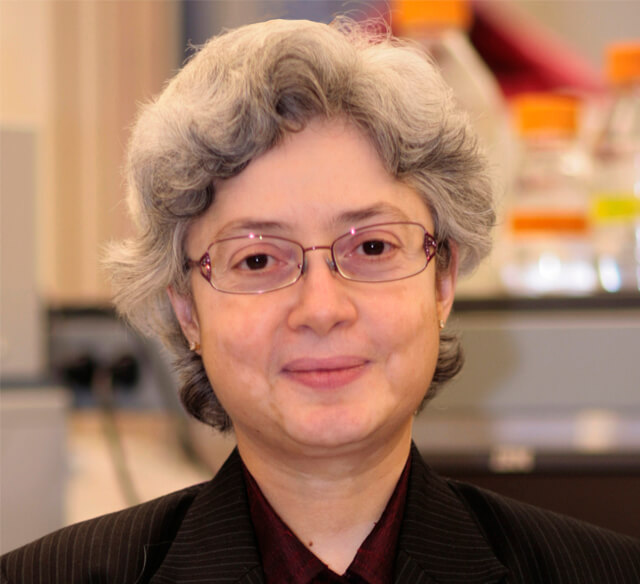
Zaver Bhujwalla, MSc, PhD, Johns Hopkins University School of Medicine, USA
“Molecular Imaging and Theranostics of the Tumor Microenvironment”
The 2017 Gold Medal Award was presented to Dr. Zaver Bhujwalla, the Director in the Division of Cancer Imaging Research, Department of Radiology and Professor of Radiology and Radiological Science at the Johns Hopkins University School of Medicine. Her Gold Medal Lecture highlighted her work in molecular imaging, dedicated to the applications of molecular and functional imaging to understand and target cancer and the tumor microenvironment. She is a Fellow of the International Society of Magnetic Resonance in Medicine, the American Institute of Biomedical Engineers. She has served as a member of the WMIS Board of Trustees and is a Fellow of the World Molecular Imaging Society.
2016 Gold Medal Award

Simon Cherry, PhD,
University of California, Davis, USA
“EXPLORing the Sensitivity Limits of Positron Emission Tomography”
The 2016 Gold Medal Award was presented to Dr. Simon Cherry, PhD, Departments of Biomedical Engineering and Radiology, University of California Davis. Dr. Cherry develops novel technologies and methods for quantitative biomedical imaging. The Cherry Lab focuses on molecular imaging using positron emission tomography (PET) scanning; in particular developing faster and more sensitive detection technologies. The laboratory has developed technologies with widespread applications for improving diagnosis, stratifying patients for treatment and assessing response to that treatment. The team is currently studying pathologic processes that involve multiple organs systems or the entire body. Cherry co-leads the EXPLORER project, a collaboration with several colleagues to develop the world’s first medical imaging system that can capture a 3D image of the entire human body simultaneously.
2015 Gold Medal Award

Vasilis Ntziachristos, M.Sc., Ph.D.
Technische Universitat, Munich, Germany
“The New Era of Optical and Optoacoustic Imaging”
The WMIC 2015 Gold Medal Award was presented to Prof. Vasilis Ntziachristos, M.Sc., Ph.D., for his pioneering work in the field of optical molecular imaging, providing solutions for deep tissue imaging, advancing quantitative and biologically specific interrogation of living systems, and for advancing the applications of these agents to in vivo diagnosis in humans. Professor Ntziachristos is currently the Professor and Chair for Biomedical Imaging, School of Medicine and School of Engineering at the Technische Universitat Munchen in Munich, Germany and the Institute of Biological and Medical Imaging, Helmholtz Zentrum Munchen, Munich-Neuherberg, Germany
2014 Gold Medal Award
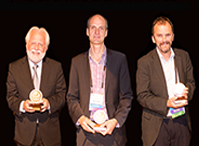
University of California San Francisco Team: Professors Nelson, Kurhanewicz and Vigneron
GE-Amersham Team: Professors Golman and Ardenkjær – Larsen
University of Cambridge Team: Professor Brindle and colleagues
“Pioneering Work in the Field of DNP-induced Hyperpolarized MRI”
In 2014 the Gold Medal Award committee of the World Molecular Imaging Society unanimously voted to recognize the pioneering work in the field of DNP-induced hyperpolarized MRI, for the introduction of new and novel hyperpolarizable agents with biological significance, and for advancing the applications of these agents for in vivo diagnosis in humans. The work from three outstanding research teams, University of California San Francisco, GE-Amersham, and the University of Cambridge was identified by the Committee as meriting the Gold Medal Award, and was unanimously approved by the Board of Trustees.
2013 Gold Medal Award

A. Dean Sherry, PhD
UT Southwestern Medical Center, Dallas, USA
“Design Concepts for MR Agents That Respond to Metabolism: How far have we come? – How far can we go?”

Silvio Aime, PhD
University of Torino, Italy
“From Relaxation Enhancers to Frequency-Encoding Agents: How MRI Competes in the Molecular Imaging Arena”
In 2013 the WMIS Awards Committee chose two winners Dr. Silvio Aime, PhD and Dr. A. Dean Sherry, PhD as their innovations were so closely tied that they made ideal joint candidates for the WMIS Gold Mewdal Award.They were chosen for the award for their pioneering work in chelate chemistry, the development of novel probes, and the establishment of a new class of paramagnetic magnetic resonance imaging (MRI) contrast agents based on the transfer of saturated magnetization to the water resonance (chemical exchange saturation transfer) that significantly advanced the applications of MRI and MRS molecular imaging for in vivo diagnosis.
2012 Gold Medal Award
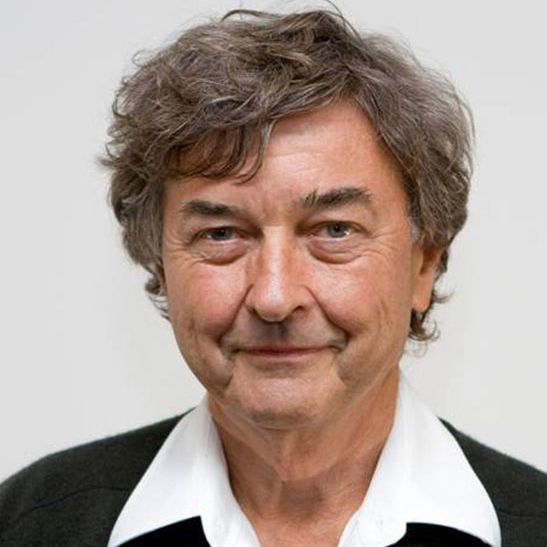
Michael E. Phelps, PhD
University of California Los Angeles, USA
In 2012 the Gold Medal Award committee of the World Molecular Imaging Society unanimously voted to recognize the work of Dr. Michael E. Phelps for together with Drs. Ed Hoffman and Ron Nutt, he pioneered the development of PET technology and transferred it to a very important clinical application. Dr. Phelps established the role of PET in drug development and has been involved in the development of novel imaging probes for PET which enabled the early detection of disease and laid the cornerstone for modern radiopharmaceutical developments.
Institute for Clinical PET (ICP) and Academy of Molecular Imaging (AMI) Distinguished Scientist Award Winners
1994: Giovanni DiChiro, MD (first year given)
1995: Michael E. Phelps, PhD
1996: Alfred P. Wolf, PhD
1997: Louis Sokoloff, MD
1998: R. Edward Coleman, MD
1999: Ronald Nutt, PhD
2000: William C. Eckelman, PhD
2001: Richard L. Wahl, MD
2002: Prof. Dr. Markus Schwaiger
2003: No award given due to Madrid meeting
2004: Sanjiv “Sam” Gambhir, MD, PhD – Basic Scientist Awardee
David W. Townsend, PhD – Peter Valk Clinical Scientist Awardee
2005: Joanna S. Fowler, PhD – Basic Scientist Awardee
Anthony J. Shields, Md, PhD – Peter Valk Clinical Scientist Awardee
2006: Ralph Weissleder, Md, PhD – Basic Scientist Awardee
Heinrich R. Schelbert, MD – Peter Valk Clinical Scientist Awardee
2007: Simon Cherry, PhD – Basic Scientist Awardee
Steven M. Larson, MD – Peter Valk Clinical Scientist Awardee
2008: Michael J. Welch, PhD – Basic Scientist Awardee
Barry A. Siegel, MD – Peter Valk Clinical Scientist Awardee
2009: Robert J. Gillies, PhD – Basic Scientist Awardee
Bruce E. Hillner, MD – Peter Valk Clinical Scientist Awardee
2010: Thomas J. Meade, PhD – Basic Scientist Awardee
Jorge R. Barrio, PhD – Barrio Clinical Molecular Imaging Award
2011: Vasilis Ntziachristos, PhD – Basic Scientist Awardee
Gooitzen M. van Dam, MD, PhD – Barrio Clinical Molecular Imaging Awardee
Society of Molecular Imaging (SMI) Imaging Achievement Award Winners
2002: Juri Gelovani, MD, PhD, UT MD Anderson Cancer Center, Houston, TX USA
2003: Ralph Weissleder, MD, PhD, Massachusetts General Hospital, Harvard, Charlestown, MA USA
2004: Sanjiv “Sam” Gambhir, MD, PhD, Stanford University, Stanford, CA USA
2005: David Piwnica-Worms, MD, PhD, Washington University Medical School, St. Louis, MO USA
2006: Christopher H. Contag, PhD, Stanford University School of Medicine, Stanford, CA USA
2007: Michael J. Welch, PhD, Washington University, St. Louis, MO USA
2008: Britton Chance, PhD, ScD (Cantab.), MD (Hon), University of Pennsylvania & National University of Singapore
2009: Roger Tsien, PhD, University of California, San Diego, CA USA
2010: Thomas J. Meade, PhD, Northwestern University, Evanston, IL, USA
2011: Simon Cherry, PhD, University of California, Davis, CA, USA
